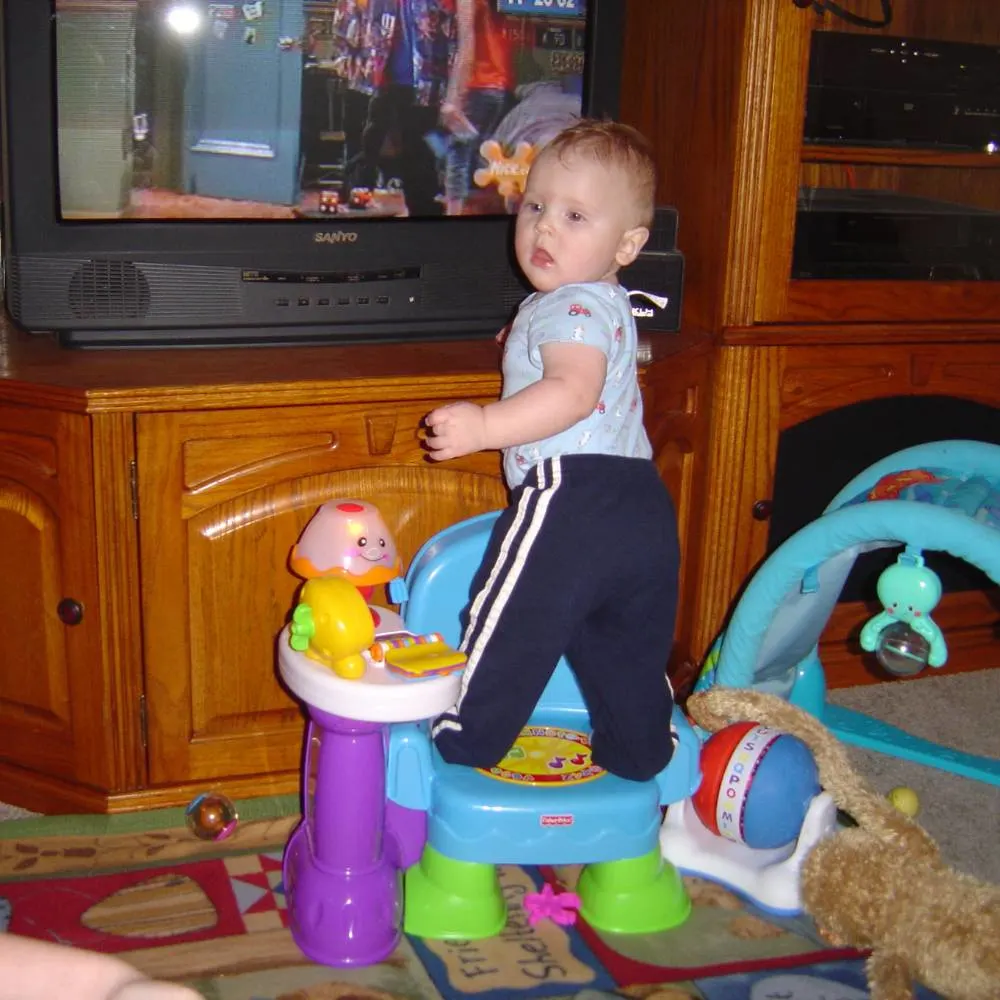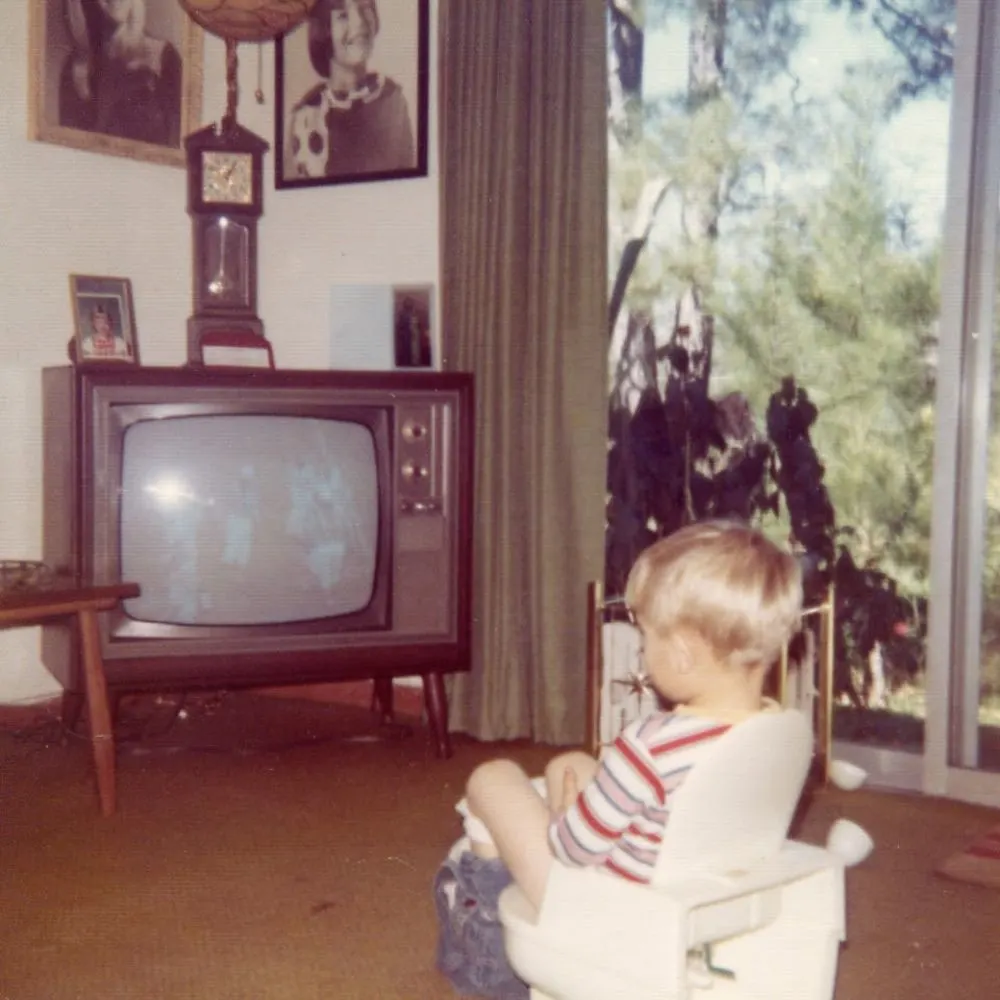- Clay Moon Phase Wall Hanging - July 4, 2023
- What To Do When a Toddler Won’t Keep Their Blanket On - June 10, 2023
- How Do Child Locks Work in Cars? (And When To Use Them!) - June 10, 2023
Screentime can be a great distraction for a toddler while you are trying to get a few household chores done. But what should you do if they start requesting to watch the TV all the time?
If your toddler keeps asking to watch TV, you need to set boundaries for your child, as too much time in front of the television is bad for child development; setting screen time limits will help regulate their expectations on TV time.
This article will explain the science behind children’s TV usage and what you can do to limit screen time. It will also detail some symptoms of screen addiction to help you be aware of warning signs that signal your toddler is watching too much TV.
*In the picture below, our little bundle of joy already had preferences and was on a mission to watch what he wanted. Take note of his innovation in building a ladder. He may have learned that from Bob the Builder.

How to Regulate Screen Time for Your Toddler
If you notice your child asking for too much TV, it is time to take measures to regulate screen time. Sometimes children can get carried away with watching their favorite programs, and as parents, it is your job to help them when that happens.
Here’s what you can do if your toddler is watching too much TV:
- Restrict screen time to 60 minutes or less per day. Set an alarm to remind you and your toddler when the time is up. Include the one-hour screen time as part of a daily routine, so your toddler knows when to expect TV time.
- Choose the right programs for your child. Avoid showing them too many flashy cartoons and stick to educational/interactive programs. Toddlers can learn more from educational shows because they are slower-paced and focus on specific skills.
- Watch TV with your child. Watching programs with your child gives both of you opportunities to interact with each other, which is good for their development.
- Plan other activities. Plan activities that take your child out of the house, such as cycling, walking, swimming, or going to the playground. This helps prevent them from being distracted by the TV.
- Be a good role model to your toddler. Practice good screen habits by limiting your own time with the TV. Children learn from examples, and they will model your behavior.
How Much Screen Time Should a Toddler Have?
Not all videos are bad for children. Some TV programs produced for toddlers are interactive and educational, which can be good for the developing brain. However, watching these programs in moderation is key.
A toddler should have no more than an hour of screen time a day. This includes mobile phones, tablets, and television screens. Supervising and watching programs with your child will help you monitor how much screen time they are getting.
The World Health Organization (WHO) stresses that getting the correct balance between sedentary behavior, physical activity, and quality sleep is crucial for children to develop good habits as they grow up (source).
Children need more play and less sedentary screen time, but if screen time is unavoidable, the WHO recommends the following guidelines:
- For one-year-olds: Screen time is not recommended.
- For two-year-olds: Not more than one hour a day; the less, the better.
- For three-year-olds: Not more than one hour a day; the less, the better.
Similarly, the American Association of Pediatrics (AAP) recommended that toddlers between 18 to 24 months old should have no screen time, with the only exception being video calls (source).
What Happens If a Toddler Watches TV All Day?
Studies have shown that toddlers learn much less from TV shows than from live interactions (source). When children spend too much time on TV, certain areas of their brains are not stimulated.
A toddler who watches TV all day risks developing behavior and cognitive difficulties. Too much time with videos means a toddler is not experiencing enough real-life interactions and playtime. This affects how a child’s brain develops since they are not learning human behavior from the TV.
A toddler’s brain develops rapidly during the first three years of life, and they learn best through live human interaction. A screen provides no real interaction — children are hyper-focused on videos, which impairs their attention span and motivation to do other things like play (source).
Surveys conducted by the AAP show that 92.2% of one-year-olds are already using mobile devices and that most two-year-olds are on their screens daily (source). These statistics show that younger children consume media in the earliest stages of their lives when their brain is most actively learning about the world.
If a toddler watches TV all day, they risk developing the following as they grow up:
- Poor attention
- Bad sleep habits
- Weight issues
- Hyperactivity
- Language development deficits
- Poor reading, writing, and math skills
- Poor short-term memory
- Aggressive behavior

Signs of Screen Addiction in Young Children
Knowing when too much screen time is affecting your child will help halt screen addiction before it takes hold. If you notice the following behavior from your toddler, it is likely that they have developed or are developing a TV addiction:
- Losing interest in other activities. Your toddler does not seem interested in doing much else other than watching TV.
- Preoccupation with media content. You notice that your child always thinks and talks about media content throughout the day.
- Suffering from withdrawal. Your toddler gets frustrated and may throw tantrums when not allowed screen time.
- Social relationships are affected. Family time and mealtimes are disrupted because your kid wants to watch TV instead of participating in social interactions.
- The TV becomes their mood booster. They start relying on the TV for happiness and comfort, a sign of codependent behavior.
Final Words
If your toddler is asking to watch TV all day, you can set boundaries to help them avoid becoming addicted. Experts recommend only an hour of screen time for toddlers two to three years old and none for those two years and below.
Things you can do to facilitate your toddler’s healthy development and reduce screen addiction, include limiting screen time, choosing appropriate programs when TV is allowed, and planning other mental and physical activities such as art projects and visits to the park.
Author Notes:
Teresa is a Registered Nurse in the State of Texas and the mother of two. Opinions and insights on childcare are based on professional knowledge, academic research, and personal experience.
Recommended Reading:
- Is It Normal for a Toddler To Laugh in Their Sleep?
- What To Do When a Toddler Pushes You Away When Crying
- What To Do When a Toddler Doesn’t Respond to “No”
Make Your Own Beautiful Living Succulent Wreath Centerpiece! Complete video course by Jeannine Romero now available through Skillshare.
